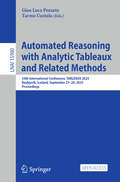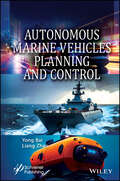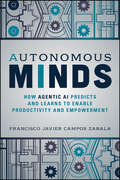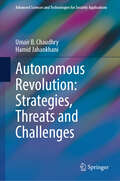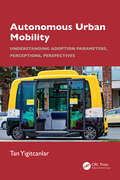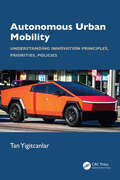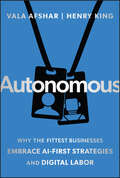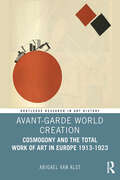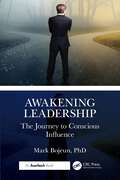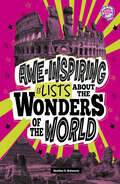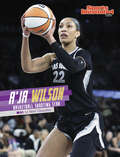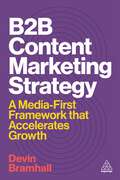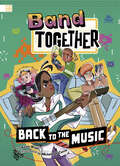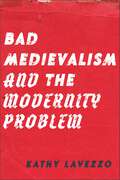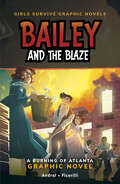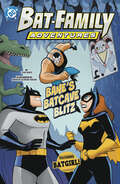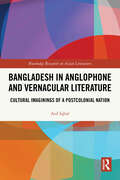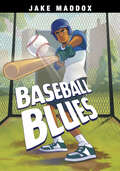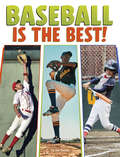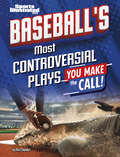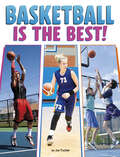- Table View
- List View
Automated Reasoning with Analytic Tableaux and Related Methods: 34th International Conference, TABLEAUX 2025, Reykjavik, Iceland, September 27–29, 2025, Proceedings (Lecture Notes in Computer Science #15980)
by Tarmo Uustalu Gian Luca PozzatoThis open access book constitutes the proceedings of the 33rd International Conference on Automated Reasoning with AnalyticTableaux and Related Methods, TABLEAUX 2025, held in Reykjavik, Iceland, during September 27–29, 2025. The 25 full papers included in this book were carefully reviewed and selected from 47 sbumissions. They were organized in topical sections as follows: Classical and multi-valued logic, theorem proving; modal and tense logic; and intuitionistic and substructural logic.
Autonomous Marine Vehicles Planning and Control
by Liang Zhao Yong BaiMaster the future of marine exploration and technology with Autonomous Marine Vehicles Planning and Control, which provides a comprehensive, interdisciplinary guide to the principles, control, and real-world applications of autonomous marine vehicles. Autonomous Marine Vehicles Planning and Control explores the intricate and rapidly evolving field of autonomous marine vehicles, focusing on unmanned surface vehicles (USVs) and autonomous underwater vehicles (AUVs). This book is designed to provide a comprehensive overview of the fundamental principles, advanced control methodologies, and practical applications of these autonomous systems in various marine environments. Through a series of detailed chapters, the book delves into the technical aspects, innovative algorithms, and real-world challenges associated with the deployment and operation of USVs and AUVs. Through a highly technical and research-oriented approach, each chapter combines theoretical analysis with practical case studies and simulation results to illustrate the effectiveness of the proposed methods. The book also addresses the interdisciplinary nature of the field, integrating concepts from robotics, artificial intelligence, and marine engineering to provide a holistic view of autonomous marine vehicle technology.
Autonomous Minds: How Agentic AI Predicts and Learns to Enable Productivity and Empowerment
by Francisco Javier Campos ZabalaA book that combines a technical explanation of agentic AI with the latest practical applications In Autonomous Minds: How Agentic AI Predicts and Learns to Enable Productivity and Empowerment, technology leader Francisco Javier Campos Zabala delivers a comprehensive, first principles analysis of AI agents and their potentially transformative impact on society, business, and individual lives. The book helps non-technical readers make sense of the technological complexity of artificial intelligence and explains its current practical applications. Campos Zabala offers a clear and accessible explanation of these new technologies, walking you through practical frameworks for implementing AI agents in business and personal contexts. Inside the book: Expert insights from leading researchers and practitioners in AI Accessible introductions to the fundamentals of agentic AI, as well as advanced applications Hands-on guidance for professionals attempting to adapt to AI-driven change Perfect for managers, executives, and other business leaders, Autonomous Minds is an essential guide for all professionals doing their best to make sense of new agentic AI technologies.
Autonomous Revolution: Strategies, Threats and Challenges (Advanced Sciences and Technologies for Security Applications)
by Hamid Jahankhani Umair B. ChaudhryThis book offers a comprehensive dive into the rapidly evolving world of autonomous vehicles and their pivotal role in modern data collection and mission-critical operations. From unmanned vehicles (UVs) navigating complex urban landscapes to traversing remote environments, the integration of advanced algorithms and cloud-based infrastructure enables real-time data acquisition and processing. Topics covered include resilient navigation systems, bio-inspired evolution for safer collaboration, and the crucial governance and security challenges facing land, air, and sea-based UVs. Additionally, the book explores emerging threats, such as cyber-physical vulnerabilities, counter-drone technologies, and the need for secure Flying Ad-Hoc Networks (FANETs). The future of UVs is further examined through the lens of quantum computing, pushing the boundaries of autonomous navigation and decision-making. By compiling these scattered and essential topics into one resource, this book serves as a vital reference for professionals, researchers, and policymakers seeking to understand and shape the future of autonomous systems.
Autonomous Urban Mobility: Understanding Adoption Parameters, Perceptions, Perspectives
by Tan YigitcanlarThis book delves into the complex landscape of autonomous urban mobility, analysing the factors that influence public adoption, stakeholder perspectives, and societal perceptions in this rapidly evolving field. Aimed at scholars, policymakers, urban planners, and industry professionals, this book offers a thorough exploration of the key elements driving the integration of autonomous vehicles in urban settings. Drawing on empirical evidence from diverse case studies, it first investigates public awareness, emphasising the roles of knowledge, exposure, and media in shaping perceptions of autonomous vehicles, and underscores the critical need for targeted awareness campaigns. Subsequent chapters examine pre-trial attitudes towards autonomous shuttles, demonstrating how initial experiences significantly impact adoption willingness, and advocate for pilot programs to cultivate informed, positive perceptions.This book also explores the potential of smart mobility solutions to bridge first/last mile gaps, presenting data on how autonomous vehicles can improve urban transport efficiency and accessibility. By analysing socio-demographic predictors, it highlights varying perceptions of the benefits and challenges of autonomous demand-responsive transit, underscoring the importance of tailored strategies for diverse urban populations. Stakeholder perspectives, gathered through interviews and case studies, offer practical recommendations for overcoming technological, regulatory, and societal hurdles. Comparative insights from international case studies broaden the understanding of local factors influencing autonomous vehicle acceptance, while advanced modelling techniques identify the key drivers of driverless car adoption. Finally, this book explores the transformative potential of autonomous vehicles in developing countries, offering visionary insights into their capacity to reshape urban landscapes.With its data-rich content and forward-thinking analysis, this book is an indispensable guide to the future of urban transportation and the critical role of autonomous mobility.This volume, alongside its companion—Autonomous Urban Mobility: Understanding Innovation Principles, Priorities, Policies—offers a holistic view of autonomous urban mobility. Together, these books provide a comprehensive exploration of the rapidly evolving landscape of autonomous urban mobility, the principles guiding its innovation, the wide-ranging impacts of its adoption on society, policy, and urban environments, and the transformative potential of autonomous vehicles in the future of urban transportation.
Autonomous Urban Mobility: Understanding Innovation Principles, Priorities, Policies
by Tan YigitcanlarThis book provides a comprehensive exploration of the rapidly evolving field of autonomous urban mobility, examining its transformative potential and the principles guiding its innovation. This essential resource offers deep insights into the societal, policy, and urban impacts of autonomous vehicles, drawing on an extensive body of research. Beginning with a review of smart urban mobility innovations, the book explores technological advancements such as connected vehicles, mobility-as-a-service platforms, and shared autonomous systems, evaluating their successes and challenges.This book traces the evolution of autonomous vehicle research over the past two decades, identifying key trends, methodologies, and future research directions, underscoring the importance of interdisciplinary approaches to address complex challenges. Subsequent chapters critically assess the technical capabilities, societal impacts, and policy frameworks necessary for the widespread adoption of autonomous vehicles, with a focus on implications for land use, infrastructure, and environmental planning. Public acceptance is a recurring theme, with an in-depth analysis of socio-demographic, psychological, and contextual factors influencing attitudes towards autonomous mobility. This book also examines the role of shared autonomous systems in addressing urban challenges such as congestion and equity, highlighting their potential to create more sustainable urban transportation networks. Concluding with a discussion on the disruptive impacts of autonomous vehicles on urban form and land use, the author provides a balanced perspective on the opportunities and risks of mobility-as-a-service.This key reference book equips academics, policymakers, urban planners, and industry professionals with the knowledge to navigate the complex interplay of technology, policy, and societal impact, advancing the vision of smarter and more sustainable cities.This volume, alongside its companion—Autonomous Urban Mobility: Understanding Adoption Parameters, Perceptions, Perspectives—offers a holistic view of autonomous urban mobility. Together, these books provide a comprehensive exploration of the rapidly evolving landscape of autonomous urban mobility, the principles guiding its innovation, the wide-ranging impacts of its adoption on society, policy, and urban environments, and the transformative potential of autonomous vehicles in the future of urban transportation.
Autonomous: Why the Fittest Businesses Embrace AI-First Strategies and Digital Labor
by Henry King Vala AfsharA compelling roadmap to building an autonomous business, best positioned to win, using digital labor powered by Agentic and physical AIAn autonomous business is designed to be AI-first in its strategies and operations to maximize value and minimize time to value, and when it is done right it will unlock unprecedented speed, scale and shared success. But getting from one-off AI implementations - where most companies are at today - to autonomy will be neither easy nor obvious. Business leaders will need to challenge all the conventions, standard operating procedures and orthodoxies underpinning businesses designed by humans for humans – which is to say just about all of them! They will need to build digital labor to non-linearly scale the health, conditioning and talent of their teams, business and ecosystem, enabling 24x7x365 continuity and responsiveness, removing blockages and waste that trap or reduce value. They will need to manage the relationships between the two types of intelligent resources, digital and human. They will need to design for AI control and teach human leaders to “let go of the steering wheel”. The goal of Autonomous is to further expand the Boundless design principles that have guided the fastest growing companies in the world, and to ready business leaders, strategists and designers for success in the AI economy.
Avant-Garde World Creation: Cosmogony and the Total Work of Art in Europe 1913-1923 (Routledge Research in Art History)
by Abigael van AlstThis book explores the widespread fascination with world creation among early twentieth-century artists and examines those trends within the European avant-garde.The book reflects on what ‘the world’ looks and feels like before and after World War One—and thus also concerns creativity and destruction alike in the context of modernity. Over the course of three chapters, the author focusses on works in which avant-garde artists combine and experiment with various arts and media to create alternative narratives of the world’s creation. These works include three canonized ‘total works of art’: Der Weltbaumeister (The World’s Master Builder, 1920), an illustrated book imagined as an architectural play by the Expressionist architect Bruno Taut; the Futurist opera Победа над Cолнцем (Victory Over the Sun, 1913) by Aleksei Kruchenykh, Velimir Khlebnikov, Kazimir Malevich and Mikhail Matiushin; and the Cubist ballet La Création du monde (The Creation of the World, 1923) by Blaise Cendrars, Fernand Léger, Darius Milhaud and Jean Börlin. Providing new readings of these classic works that dive deeply into the avant-garde’s inter-artistic search for new modes of mediation as well as its dialogue with science, politics and technology, Abigael van Alst demonstrates how each of these artworks staged a cosmogony—an alternative story of the universe's creation—which, simultaneously, experimentally and critically recounted the story of modernity.This new book is ideal for researchers and scholars in History of Art, Modernism, and Comparative Literature.
Awakening Leadership: The Journey to Conscious Influence
by Mark Bojeun, PhDIn a time defined by complexity, disruption, and rapid innovation, Awakening Leadership: The Journey to Conscious Influence offers a transformative roadmap for leaders ready to rise with clarity, courage, and conscience. Merging timeless leadership principles with modern insights in emotional intelligence, mindfulness, ethical decision-making, and AI ethics, this book redefines how leaders influence, inspire, and impact the world around them.Across fifteen compelling chapters, Dr. Mark Bojeun presents an integrated framework for conscious leadership—one that harmonizes performance with purpose and results with relationships. Readers will explore how to cultivate self-awareness, lead with authenticity, and build the emotional resilience necessary to thrive in uncertain environments. They will discover how to foster inclusive, values-driven cultures that ignite innovation, while learning to communicate with empathy, intentionality, and strategic presence.The book also provides guidance for navigating ambiguity, driving transformation, and leading with clarity in an increasingly AI-augmented world—all while aligning personal development with meaningful organizational impact.Whether you are a senior executive refining your leadership presence, an emerging leader seeking deeper influence, or an educator preparing the next generation of changemakers, Awakening Leadership: The Journey to Conscious Influence delivers the mindset, structure, and tools to lead consciously and create a legacy built on trust, relevance, and purpose.Lead with awareness. Influence with integrity. Transform with intention.
Awe-Inspiring Lists About the Wonders of the World
by Heather E. SchwartzThe world is an amazing place. Natural wonders, like black-sand beaches and white rainbows, and human-made achievements, like skyscrapers and technology, are just waiting to be explored! Bright pictures, humorous designs, and amazing facts will invite readers to appreciate the wonders of the world.
A’ja Wilson
by Matt ChandlerA’ja Wilson comes from a family of basketball players. But she wasn’t born a superstar. In fact, Wilson was not a natural talent. She worked hard to become the best player, and it paid off. In middle school, Wilson was promoted to the high school varsity team. After that, there was no stopping her! From her college career at the University of South Carolina to her professional career with the Las Vegas Aces, Wilson’s determination shines through in this encouraging sports biography.
B2B Content Marketing Strategy: A Media-First Framework That Accelerates Growth
by Devin BramhallHow can you create B2B content marketing strategies that deliver predictable growth?B2B Content Marketing Strategy is a practical guide for mid-career marketers who want to implement human-centric strategies that break through long, complex buyer journeys and deliver measurable results. It combines proven principles, detailed frameworks and actionable tools to help you optimize content across every stage of the marketing cycle.Written by B2B marketing expert, Devin Bramhall, for professionals navigating shifting buyer behaviour, rapid platform changes and outdated playbooks, this book shows how to align media, technology, and audience insight to achieve sustainable growth. Drawing on real-world examples from Cisco, Help Scout and Navattic, you will learn how to:- Develop living audience profiles that evolve with market needs- Apply a media-first approach across owned, earned and paid channels- Optimize content plans to align with brand and revenue goals- Build communities that increase reach, trust and loyaltyWith detailed chapters, practical models and case studies from startups to global enterprises, B2B Content Marketing Strategy equips you to implement high-impact strategies that strengthen credibility, accelerate growth and enhance your career impact.Themes include: strategy, principles, B2B marketing, media-first approach, content optimization, audience engagement
Back to the Music
by Keith WainThe band is working on a cover of a song for the first time. It should be fun and fresh and exciting. And it is—for Soren. But the rest of the band is distracted. An old video game console is one problem, and phones keep the band's attention wandering. It feels like music is a thing of the past.
Bad Medievalism and the Modernity Problem
by Kathy LavezzoChallenges the assumptions made over the medieval/modern divide by examining the medieval roots of modern racism Humanists have long insisted on a chasm separating modernity and the Middle Ages. In Bad Medievalism and the Modernity Problem, Kathy Lavezzo demonstrates how the temporal divide scholars typically accept is a fiction that has shaped racial discourse over a longue durée. The hard line drawn between “then” and “now” is of a piece with the line separating whiteness from humans deemed irrevocably other. Thus, Lavezzo advocates a “bad”—that is, depressing and disturbing, even nauseating—historicism attuned to the interpenetration of race, whiteness, and periodicity in the “west.” Teasing out the dialectical invocation of both periods by figures as diverse as W. E. B. Du Bois, Carolyn Bynum, Stuart Hall, Johan Huizinga, Paule Marshall, Karl Marx, Gloria Naylor, J. R. R. Tolkien, and Sylvia Wynter, Lavezzo demonstrates how the tension between and across categories of the “medieval” and the “modern” has mobilized intense emotional and political responses. Inspired by Lavezzo’s discovery that Hall, the beloved founder of cultural studies, planned as a student at Oxford to become a medievalist but was dissuaded from that path by his teacher Tolkien, Bad Medievalism and the Modernity Problem unpacks the implications of that charged encounter. Central chapters contrast Tolkien’s white heritage medievalism with a speculative inquiry into the Piers Plowman dissertation that Hall never wrote. Other chapters assess the white “feel” of periodization by scholars, including Jacob Burckhardt, Huizinga, Fredric Jameson, and Bynum, and draw on theorists, including Du Bois and Wynter, to chart the medieval roots of a racialized discourse of progress and primitivism. Bad Medievalism and the Modernity Problem culminates in new readings of Gloria Naylor’s Bailey’s Cafe and Paule Marshall’s The Fisher King, demonstrating their importance as productively pessimistic engagements with the racial legacies of both the medieval and the modern.
Bailey and the Blaze
by Dolores AndralThe year is 1864 and Atlanta, Georgia, has been set ablaze during the Civil War! Twelve-year-old Bailey is feeling nervous as the Union Army advances on Atlanta. While most people are fleeing the city, her family is not. Bailey’s father works at a newspaper, and he must stay to report the news. But when the Union Army arrives and sets fire to the city, her whole family is in danger. Will Bailey find a way to help protect her family as Atlanta burns to the ground?
Bake Your Own Brownies
by Mari BolteCraving chocolate goodness? Early and emergent readers can bake their own batch of yummy fudgy brownies! Step-by-step instructions plus clear photos guide elementary children through this simple and sweet recipe that they (with a little adult assistance) can make themselves—and then enjoy!
Bake Your Own Cookies
by Mari BolteA warm cookie is a special treat. Early and emergent readers can bake their own batch of sugar cookies topped with colorful sprinkles! Step-by-step instructions plus clear photos guide elementary children through this simple and sweet recipe that they (with a little adult assistance) can make themselves—and then enjoy!
Bake Your Own Cupcakes
by Mari BolteIt’s a party with this festive dessert! Early and emergent readers can bake their own batch of sprinkle cupcakes topped with creamy vanilla frosting. Step-by-step instructions plus clear photos guide elementary children through this simple and sweet recipe that they (with a little adult assistance) can make themselves—and then enjoy!
Bake Your Own Soda Bread
by Mari BolteFresh bread is yummy to smell and even tastier to eat! Early and emergent readers can bake their own loaf of soft soda bread topped with honey butter. Step-by-step instructions plus clear photos guide elementary children through this simple recipe that they (with a little adult assistance) can make themselves—and then enjoy!
Bane’s Batcave Blitz
by Steve KortéBane is bringing a battle straight to Batman’s home turf! After planting a tracking device on the Batmobile, this super-villain follows the Dark Knight to his underground headquarters, the Batcave. Caught off-guard, Batman signals members of the Bat-Family for help, including his crime-fighting partner Batgirl. Can the heroes stop Bane’s Batcave blitz, or will this villain claim the Batcave’s trophy room as his prize? Full of fast-paced action and vibrant illustrations, this Bat-Family Adventures book is perfect for young super hero fans!
Bangladesh in Anglophone and Vernacular Literature: Cultural Imaginings of a Postcolonial Nation (Routledge Research on Asian Literature)
by Asif IqbalThis book illuminates individual and collective imaginings of postcolonial Bangladesh. It explores the emergence of Bangladesh as a nation from a variety of perspectives.The author studies the impact of Muslim nationalism on the subaltern life-worlds of East Bengal during the Partition, religious minorities and their insecurity in East Pakistan, East Pakistan’s political insurgencies, the victims of the 1971 Bangladesh Liberation War, the Indian stake in the 1971 War, and the cosmopolitan interpretations of the war. The literary and cultural texts that inform this project include contemporary Bengali novels, South Asian Anglophone literature, as well as selected visual media and digital sources. The project’s reading of these texts in conjunction with politics and history has interdisciplinary relevance.This book will be of interest to researchers in South Asian Literature, South Asian History and Culture, World Literatures in English as well as Area Studies, Security Studies, and Political Theory.
Baseball Blues
by Jake Maddox Bryan Patrick AveryKevin Paige, the best hitter on his baseball team, is in the biggest slump of his life. Determined to get his swing back before big-time Coach Bingo can watch him play, Kevin practices more than ever. But he's getting worse—not better. Kevin will need to learn balance to find his swing again.
Baseball Is the Best!
by Joe TischlerEating a hot dog at the ballpark is fun. Watching a favorite star make a great catch is too. Whether playing it or watching it on TV, learning about the game’s rules, positions, skills, pro stars, and more will show readers just why baseball is the best! A fun quiz at the end of the book reinforces learning.
Baseball’s Most Controversial Plays
by Matt ChandlerThe history of baseball is riddled with controversial plays. In Game 6 of the 1985 World Series, the St. Louis Cardinals faced off against the Kansas City Royals in Game 6. In the bottom of the ninth inning, was the runner safe or was he out? In Game 1 of the 1996 American League Championship Series, the New York Yankees and the Baltimore Orioles took the field. In the eighth inning, was it a home run? Or did fan interference make it an automatic out? On June 2, 2010, Detroit Tigers pitcher Armando Galarraga went for a perfect game. In the final out, was the runner safe or was he out? The umpires made their calls. Now it’s your turn. Do you agree with the umps?
Basketball Is the Best!
by Joe TischlerWatching a superstar slam dunk is fun. Dribbling the ball down the basketball court is too. Whether playing it or watching it on TV, learning about the game’s positions, skills, rules, pro stars, and more will show readers just why basketball is the best! A fun quiz at the end of the book reinforces learning.
